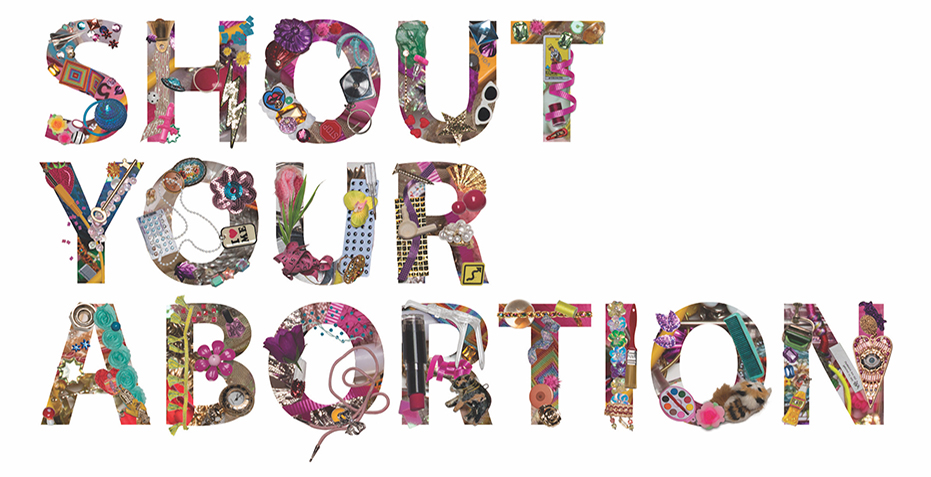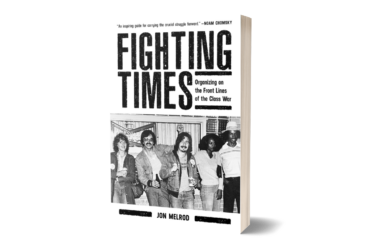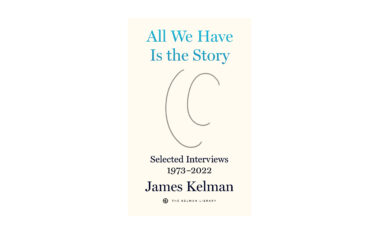By Evette Dionne
Bitch Magazine
October 10th, 2018

The world is fucked up right now. I mean, it’s been fucked up for a long time, but that reality is perhaps more palpable now than it has ever been. Brett Kavanaugh was confirmed to the Supreme Court despite credible allegations of both sexual assault and perjury; hundreds of migrant children are still separated from their parents, months after a court ordered the Trump administration to reunite them; and every day, we wake up to find a new horror unfolding. In tumultuous political and social times, I turn to nonfiction books. And right now, reading a history of women’s anger, an examination of China’s nascent feminist movement, and a biography of one of America’s greatest playwrights among other new releases, reminds me that marginalized people come from a resilient history. We will not be moved.
With that in mind, here are the 13 nonfiction books Bitch recommends for fall.
Want more seasonal reads? Make sure to sign up for our email list and we’ll send you a new BitchReads list, every quarter, in partnership with Powell’s Books!
Women are angry. We were angry long before Donald Trump became president, long before he nominated an overgrown frat boy to the Supreme Court, and long before men began dominating politics, courts, and every aspect of American life. In Rage Becomes Her, journalist and activist Soraya Chemaly outlines the myriad causes of this fury, including race and gender wage gaps, the harassment we endure in the workplace, the prevalence of intimate-partner violence, and “the immense social expectations of motherhood.” Chemaly examines why and how women’s anger is overlooked, dismissed, and denied. She also argues that anger can be productive, and outlines a 10-point action plan that encourages women to embrace our anger—and shift America’s balance of power in our direction.
Author and playwright Lorraine Hansberry died from pancreatic cancer in 1965, when she was just 34. But the work she left behind, including the indelible stage play–turned–film A Raisin in the Sun, is still a guiding light for Black Americans fighting toward freedom. In Looking for Lorraine, Princeton University professor Imani Perry offers a “deeply personal book” that explores the too-short life that took Hansberry from a middle-class Black community on Chicago’s South Side to Broadway, where she became the first Black woman to have a play produced on the famed street. Looking for Lorraine doesn’t read like traditional biography: Perry considers Hansberry her muse, and digs deep into her life for compelling stories that draw a clear comparison between Hansberry’s activism around race and policing and the current Black Lives Matter movement, highlighting the continued urgency and resonance of her work.
In 2015, five Chinese women were arrested and detained for 37 days for the crime of attempting to plan an International Women’s Day celebration. The women, who became known as the Feminist Five, have since galvanized hundreds of other feminist women in China who’ve long known their government’s authoritarian and patriarchal approach is specifically oppressive to women and other marginalized people. In Betraying Big Brother, journalist Leta Hong Fincher examines the feminist movement that’s rising in mainland China, and explores how the Feminist Five continue to covertly educate other women to confront and resist the country’s sexist policies.
Nicole Chung was raised by an all-white Catholic family in a very white Oregon community, and though she knew she was different, her family offered few answers about how a Korean child came to live with them. In All You Can Ever Know, Chung recalls a childhood spent questioning where—and if—she belonged, and her decision, in her 20s, to track down her birth parents and finally get the truth she’d been looking for. There’s a tenderness to this memoir that’s difficult to put into words. Chang addresses difficult topics, including the racism she faced in her small town, but she does so with extraordinary empathy for her birth parents, her adoptive parents, and—most important—herself.
New York Magazine writer at-large Rebecca Traister is one of the most prescient journalists of this generation. How do I know? Well, in a recent appearance on Chris Hayes’s podcast, Why is This Happening?, Traister said she decided to write a book about women’s anger while taking a walk with her husband in 2016, right after Donald Trump was elected president. Before we understood just how angry women could become, Traister knew we would get there, and in Good and Mad, she explains exactly why. The book probes the “nexus of women’s anger and American politics,” reminding readers that women’s anger has propelled every movement that permanently changed America—the labor movement, the Civil Rights Movement, and the gay-rights movement—only to be erased in their histories. Good and Mad is an effort to correct the record, and give those women—and all of those rising up now—their just due.
Heavy is not a traditional memoir, just as author and professor Kiese Laymon’s debut novel, Long Division, wasn’t a traditional narrative. Instead, Heavy functions as a 256-page letter to his mother, a political-science professor who raised him in poverty in Mississippi in the 1980s. In moving prose, Laymon lays bare his difficult childhood—taunted because of his size and the color of his skin, subjected to beatings when his grades didn’t meet his mother’s expectations, and exposed to the racism baked into every aspect of his life. Heavy is also a memoir about size, all the burdens that Laymon’s carried, and the impact they’ve had on his relationship with his body at different times in his life.
Attorney, journalist, and activist Lara Bazelon has seen her fair share of wrongful convictions. As a former public defender and director of the Loyola Law School Project for the Innocent, Bazelon has used her legal expertise to free people who were unjustifiably incarcerated because they didn’t commit the crime, were railroaded by the criminal-justice system, or simply didn’t have the financial means to secure an adequate defense. In Rectify, Bazelon argues for restorative justice as a necessary resolution in these exonerations: not simply for a victim’s rights and well-being, but because such justice is the only way to ensure that prosecutors, juries, and other players will understand and be accountable for the depth of damage that results when an innocent person is sent to prison.
Well-Read Black Girl, a Brooklyn-based book club and annual conference, is a safe haven for many Black women readers. (Full disclosure: I’m a former member.) As founder Glory Edim explains in this anthology, “[S]torytelling is an extension of [Black] sisterhood,” and throughout this delightful collection, an array of both emerging and established Black women authors explain how reading has strengthened that sisterhood. Tayari Jones, Jacqueline Woodson, Jesmyn Ward, Barbara Smith, and N.K. Jesimin are among the contributors, and each of their essays capture why books have been and continue to be so essential to their identities as Black women.
For decades, taking down Planned Parenthood has been a pet project of America’s anti-choice legislators. In 2015, after Congressional Republicans failed in their attempt to defund the nation’s largest women’s-healthcare provider, Seattle activist Amelia Bonow posted on Facebook that she wanted to hear women refuse to be ashamed of their abortions. Less than two weeks later, Bonow’s friend Lindy West created the Twitter hashtag #ShoutYourAbortion, and within days more than 150,000 tweets used the hashtag just as Bonow had hoped. Three years later, as the Trump administration sets its sights on repealing Roe v. Wade, talking about abortion without shame is more vital than ever, and Shout Your Abortion, a collection of 43 personal accounts curated by Bonow, feels timely and crucial.
Are women deceptive when it comes to sex? If you listen to an entire culture that sees sex through a longstanding set of double standards, the answer is yes. Women are presumed to be lying about orgasms, the amount of partners we’ve had, whether or not we’re virgins, and even about being sexually assaulted or raped. In Faking It, sex and pornography journalist Lux Alptraum explores the persistence of a cultural narrative whose wide-ranging repercussions harm all humans. The book holds social codes, pop-culture narratives, and media myths up to the light to help readers understand why women internalize sexual shame—but also to encourage us to stop doing so simply to make others comfortable.
Author and musician Lane Moore has been outspoken about sex and relationships through her roles as an editor at Cosmopolitan, a writer at The Onion, and the creator and host of the traveling tragicomic show Tinder Live! But secretly she’s been dealing with a lifelong love/hate partnership with solitude that’s seeped into every area of her life, including her own romantic relationships. How To Be Alone recounts Moore’s life through a lens of loneliness and attachment—from a childhood longing for connection with parents who were physically present but emotionally absent to adult relationships in which a desire for companionship led to grasping onto partners who weren’t worth the effort. While Moore is delving into some of the most difficult moments of her life, she does it with wit and humor in a way that makes this book an enjoyable read.
Our former FLOTUS has become a fixture in American life. Since departing the White House in 2017, Michelle Obama has repeatedly voiced her disinterest in running for public office, but that hasn’t stopped her from encouraging other Americans to carry out their civic duties by both voting and running for office themselves. In her memoir, Becoming, Obama shines a light on her own life to reveal how she “found her voice and developed the strength to use it to empower others.” We know the basics of Obama’s life—raised on the South Side of Chicago, a graduate of Princeton University and Harvard Law School, and a legal career that landed her at the University of Chicago and law firm Sidley Austin. But Becoming tells the whole story—even the hard parts that her role as a hyper-scrutinized First Lady demanded she gloss over.
In September 2017, journalist Gemma Hartley wrote an instantly viral article for Harper’s Bazaar on the subject of emotional labor, the hidden, unacknowledged work women do on behalf of husbands and partners, children, parents and siblings, bosses and coworkers. In Fed Up Hartley expands that scope to make the compelling argument that everyone, regardless of gender, need to become more invested in the domestic duties that often fall on women. If you really want to get the full scope of women’s rage, read Fed Up, Good and Mad, and Rage Becomes Her together.
Back to Amelia Bonow’s Editor Page | Back to Emily Noke’s Editor Page


















